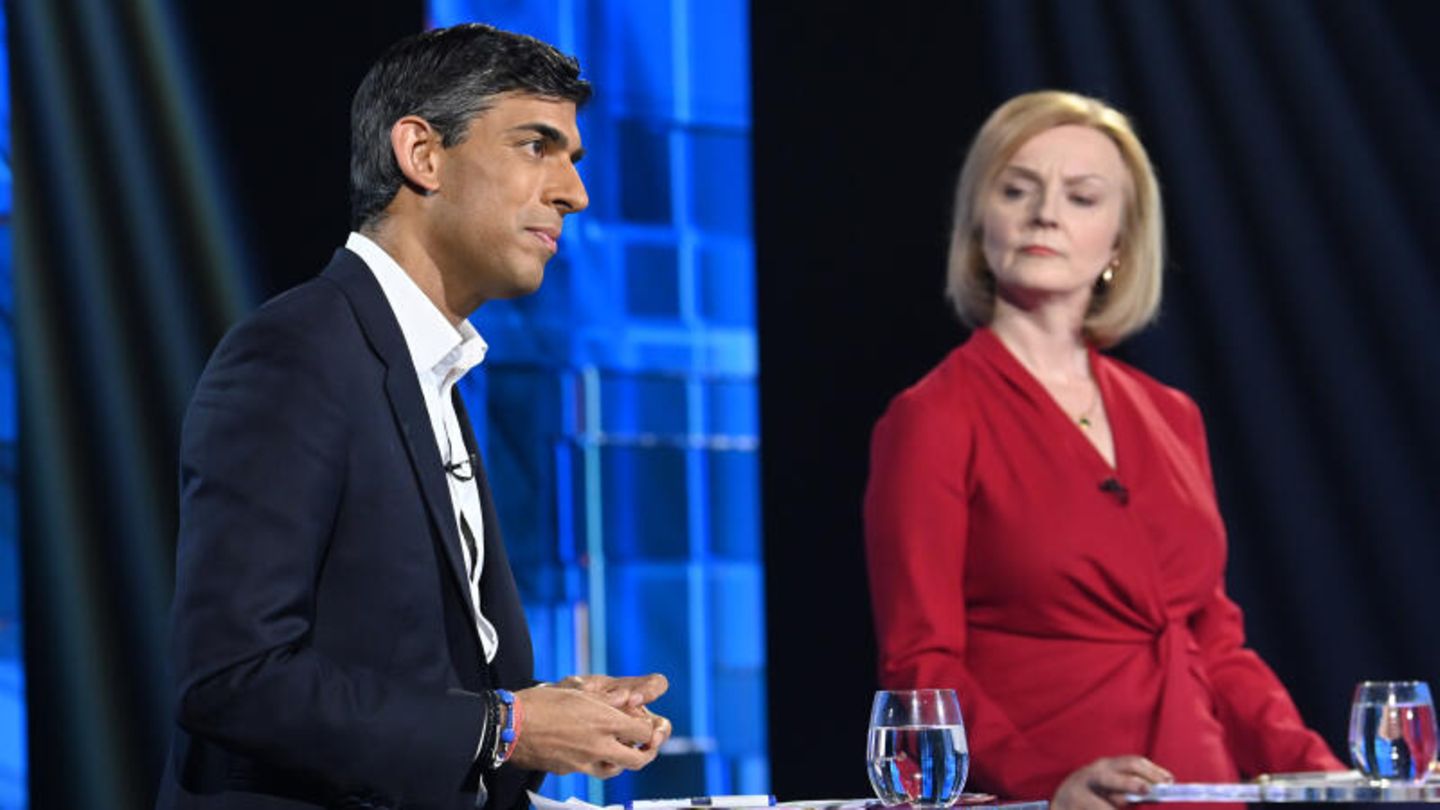Former Finance Minister Rishi Sunak is the favorite in the race to succeed Johnson. But shortly before the runoff, Secretary of State Liz Truss is hot on his heels – and has the momentum on her side.
Political London is seething. And it’s not just because of the sweltering heatwave that ravaged the UK for days. The Tory election on the big question of who will follow in Boris Johnson’s footsteps is causing heated debates and increased room temperatures.
After eight candidates competed against each other in almost daily election rounds for a week, they are certain: In his role as favorite, former Finance Minister Rishi Sunak gained a small lead with 137 MPs on Wednesday. But one woman is hot on his heels: Secretary of State Liz Truss made up a decent amount of ground with 113 votes and outperformed her competitor, Secretary of State for Commerce Penny Mordaunt, with eight votes.
However, who will finally move into Downing Street will not be decided until September 5th. While Sunak is a favorite on paper, Truss is experiencing surprising momentum.
Rishi Sunak: The man who dropped Johnson
Just a few months ago, high-flyer Rishi Sunak was considered the most promising candidate for the post of next prime minister. In February 2020, the Stanford graduate with Indian roots became finance minister in Johnson’s cabinet and had to steer the British economy through the corona pandemic and lockdowns within a very short time. Back then, when Sunak vowed to do “whatever it takes” to help people through the difficult time – and initiated £350billion in support – his personal .
Two years later, the British economy is still caught in stormy waters. At 9.4 percent, inflation is at its highest level in 40 years, and a significant increase in heating costs is expected for the fall due to the war in Ukraine. As a result, the view of the finance minister, who has now only hesitantly declared his willingness to provide billions in aid, has darkened. Critics also accuse Sunak that his wealthy wife used a legal loophole to save millions in taxes herself (). On top of that, the 42-year-old – like his former boss – is facing a police fine for attending one of the infamous Downing Street lockdown parties in June 2020.
But the decision that Sunak made on July 1 weighed much more heavily for many conservative party members. With his resignation from the cabinet, he set the ball rolling that forced Johnson days later to announce his resignation as party leader and prime minister. Johnson’s supporters – who still holds sway in his party – know only one word: treason.
Instead, Sunak is getting support from his former cabinet colleagues and those who had withdrawn their trust from Johnson. Many Tories still see him as the real helmsman for the British economy – an image he is trying to promote himself. In the TV debates, Sunak always presents himself as the only candidate who can save Great Britain. He promises to get inflation under control – even if that means no tax cuts for now, a rather unpopular view among conservatives. He also wants to oppose an independence referendum in Scotland.
Liz Truss, the new “Iron Lady”
Unlike Sunak, Secretary of State Liz Truss did not start the race in the top spots. Instead, the Tory right-wing candidate has fought her way up lap after lap – and is currently experiencing momentum. By winning many of the votes from outgoing MP Kemi Badenoch, she edged out Penny Mordaunt from second place in Wednesday’s crucial round of voting.
Truss likes to pose as , a role she had already played as a young girl in the school theater. Whether it’s photos in battle tanks or a bow tie blouse in TV debates – a characteristic of the late prime minister – Truss also positions himself as the real “true blue”. In a guest article for the “Telegraph” she describes herself as the only candidate with a “truly conservative” economic plan and shoots down Sunak’s tax increases. The 46-year-old also promises “bold reforms” in housing construction and the reduction of bureaucracy and the unbundling of EU regulations.
After a lightning-fast career, from starting as education secretary in 2012 to only the second woman to be foreign secretary, Truss has not only made a name for herself among Conservatives — she’s become a Cabinet heavyweight herself. This is also supported by one of Tuesday’s Tory party members, who sees them in a runoff before Sunak.
But Truss is not undisputed either. While she initially campaigned for the “stay” side in the Brexit dispute, she switched sides shortly before the referendum and has since sold herself as a big advocate of Brexit. In the fight for the Tory presidency, critics also accuse her of having little idea of the content and instead relying on violent attacks. Prominent Mordaunt supporter David Davis, for example, calls it the “dirtiest campaign I’ve ever seen.” Whoever moves into Downing Street has to sweep up a lot of broken pieces.
End of Boris Johnson opens new door for Labour
One thing is certain ahead of the runoff: apart from the fact that both served under Boris Johnson, the differences between Rishi Sunak and Liz Truss could not be greater. The faux pas on Tuesday evening shows that there is a certain risk for the Tories themselves.
After Sunak and Truss had rejected it, the “Sky News” broadcaster had to cancel a planned TV debate because there was too much concern that the conservative party could do more harm than good to itself with the heated arguments between the two. In any case, it was a treat for the opposition Labor Party, which promptly came up trumps with a summary of the debate that, in its own snippets, gives the Tories a lousy record of the past few years in government.
Liberals are likely to be even more excited about Electoral Calculus and Find Out Now. Asked who would be elected if Sunak or Truss were Tory leaders, the results show a clear 12 percentage point lead for Labor leader Keir Starmer – versus nine points for a Mordaunt-led party.
It’s all or nothing for Sunak and Truss. But their fate will have to wait, because from Thursday the British Parliament will take a six-week summer break. That’s how long the approximately 200,000 party members have to decide by postal vote who should take over the Tory presidency – and thus rule Downing Street in the future.
Sources: “”, “”, “”, with AFP and DPA material
Source: Stern
David William is a talented author who has made a name for himself in the world of writing. He is a professional author who writes on a wide range of topics, from general interest to opinion news. David is currently working as a writer at 24 hours worlds where he brings his unique perspective and in-depth research to his articles, making them both informative and engaging.




